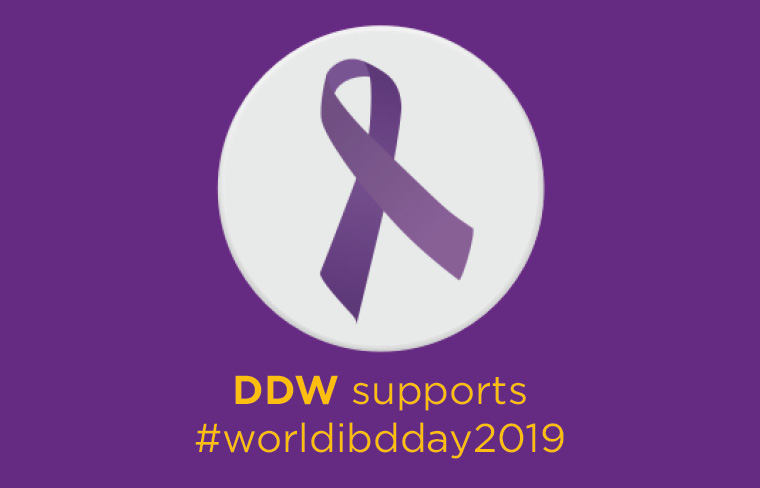Join AGA to celebrate World IBD Day at DDW® 2019
AGA World IBD Day Reception
Sunday, May 19, 5:30 p.m.
Center Terrace, San Diego Convention Center

Inflammatory bowel disease (IBD) continues to be one of the hottest topics at DDW®. It’s also one of the most persistent and growing GI diseases worldwide and the subject of a global awareness campaign that culminates today, World IBD Day.
As part of the global campaign, famous international landmarks are lit in purple today to raise awareness about the daily challenges of living with IBD. Local patient associations and activists have also organized supporting events worldwide to provide information to the public about IBD.
“This is the first time that World IBD Day falls during DDW and we are using the occasion to celebrate the best IBD research with DDW and our international cohort of researchers, clinicians and attendees,” said Uma Mahadevan, MD, AGAF, professor of medicine at the University of California, San Francisco.
“All of our research fora, symposia and plenaries that fill the DDW schedule on Sunday are reflective of World IBD Day and the purple ribbons that are the emblem of the day globally,” added Dr. Mahadevan, who will chair today’s AGA Institute Council Immunology, Microbiology & Inflammatory Bowel Diseases (IMIBD) Section Distinguished Abstract Plenary. The session will feature the top IBD abstracts submitted to DDW this year. Presentations will include results from a head-to-head trial of vedolizumab versus adalimumab in IBD.
The IBD programming gets underway Sunday morning with the AGA Research Forum IBD: Microbiome and the AGA Translational Symposium Whole Exome Sequencing and Functional Assays as Tools for Studying Early-Onset IBD. Both 90-minute sessions will feature experts from around the world.
“Predicting outcomes in IBD is an intense area of research,” Dr. Mahadevan said. “This has been an ongoing international effort to understand what factors determine how active IBD is in an individual and predicting who is going to have an adverse outcome. The microbiome forum will explore the role of microbiota and metabolites in IBD, while the translational symposium will present the latest findings in how exome sequencing might identify IBD patients with monogenic disorders and lead to patient-specific therapies.”
Another AGA Research Forum, Predicting Outcomes in IBD: Biomarkers to Endoscopy, will showcase TREM1 (triggering receptor expressed on myeloid cells 1), the first anti-TNF (tumor necrosis factor) specific biomarker that can be used to guide therapeutic decisions in IBD. Other presentations will examine how endoscopic and histologic findings are best interpreted in IBD patients.
Seven concurrent poster sessions will feature the latest findings in the preclinical treatment of intestinal inflammation, epithelial cell function in inflammation, adverse events related to IBD treatment, comparative effectiveness studies, cytokine signaling and receptors, diagnostics and uncontrolled therapeutic observations. The posters can be viewed from 9:30 a.m. to 4 p.m. in the Poster Hall. Presenters will be there to discuss their work for two hours beginning at noon.
During a new clinical symposium, Ellen Scherl-Jill Roberts Lecture — AGA Clinical Care Pathways: Optimizing IBD Care in Your Daily Practice, three experts will review key decision points in the management of ulcerative colitis and Crohn’s disease. Dr. Mahadevan will present the “Ellen Scherel-Jill Roberts Lecture — Pregnancy and IBD: Clinical Decision Tool.” The tool is the result of the IBD Parenthood Project, a joint venture of AGA, the Society for Maternal Fetal Medicine and the Crohn’s Colitis Foundation.
The AGA Research Forum Kiron and Kamala Das Symposium: World IBD Abstracts will examine IBD epidemiology and treatment from a global perspective.
“In the next 15 years, there may be more IBD patients in China than the rest of the world,” Dr. Mahadevan said. “There’s a true increase in the incidence of IBD in Asia, which may have to do with increasing westernization of diet, changes in hygiene, environmental factors or maybe all of the above. “The Das Symposium is an opportunity to see IBD from a truly global perspective and look at different diagnostic and therapeutic approaches.”
During another afternoon research forum, Pathogenesis of IBD, six investigators will review their latest IBD research, including studies on host immunity, barrier function and the role of gut microbiota in IBD.
“This is a day to appreciate the significance of the increasing incidence of inflammatory bowel disease around the world as well as the role of researchers in trying to define and defeat it,” Dr. Mahadevan said. “Immediately after the Distinguished Abstract Plenary, AGA is hosting a reception to meet our peers from around the world as we celebrate the efforts of IBD research and researchers.”
Please refer to the DDW Mobile App or the Program & Exhibits section for the times and locations of these and other DDW events.
This is a day to appreciate the significance of the increasing incidence of inflammatory bowel disease around the world as well as the role of researchers in trying to define and defeat it.
Uma Mahadevan, MD, AGAF



